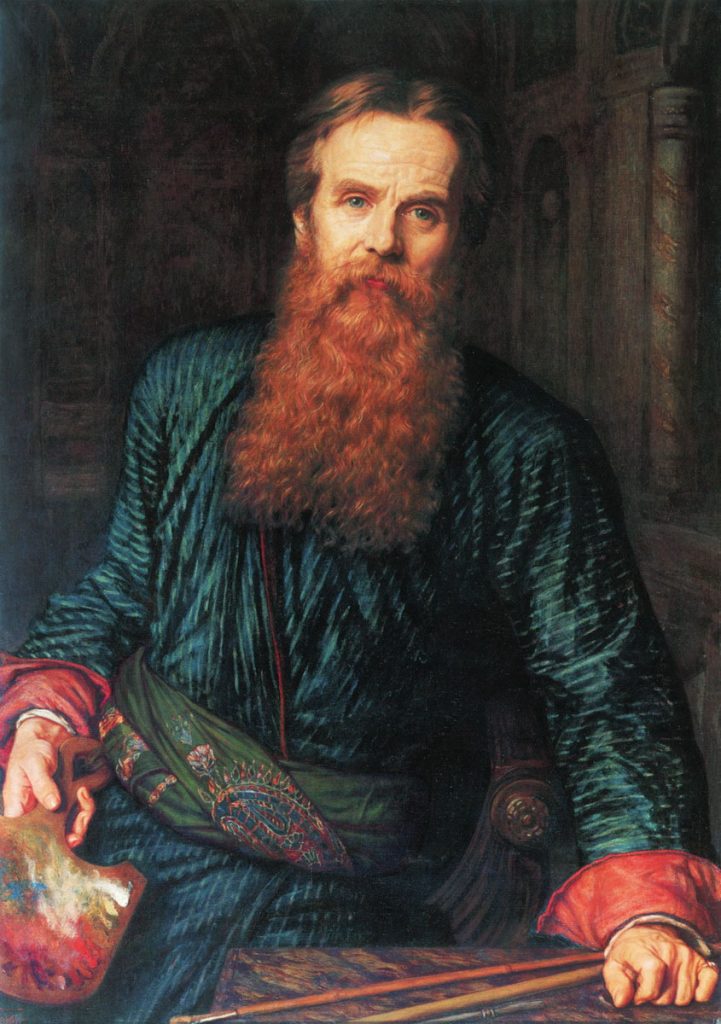Excerpt from Pre-Raphaelitism and the Pre-Raphaelite Brotherhood by William Holman Hunt
Published in 1914 by E.P. Dutton & Co.
Once in a studio conclave, some of us drew up a declaration that there was no immortality for humanity except in reputation gained by man’s own genius or heroism. We had not yet balanced our belief in
Voltaire, Gibbon, Byron, and Shelley, and we could leave no corners or spaces in our minds unsearched or unswept. Our determination to respect no authority that stood in the way of fresh research in art seemed to compel us to try what the result would be in questions metaphysical, denying all that could not be proved.
We reflected that there were different degrees of glory in great men, and that these grades should be denoted by one, two, or three stars.
Ordinary children of men fulfilled their work by providing food, clothing, and tools for their fellows; some, who did not engage in such labour, had allowed their minds to work without the ballast of common-sense, but the few far-seeing ones revealed vast visions of beauty to mankind.
Where these dreams were too profound for us to fathom, our new iconoclasm dictated at least a suspended judgment, if not distrust; for of spiritual powers we for the moment felt we knew nothing, and we saw no profit in relying upon visions, however beautiful they might be.
Arguing thus, Gabriel wrote out the following manifesto of our absence of faith in immortality, save in that perennial influence exercised by great thinkers and workers— We, the undersigned, declare that the following list of Immortals constitutes the whole of our Creed, and that there exists no other Immortality than what is centred in their names and in the names of their contemporaries, in whom this list is reflected—
- Jesus Christ****
- The Author of Job***
- Isaiah
- Homer**
- Pheidias
- Early Gothic Architects
- Cavalier Pugliesi
- Dante**
- Boccaccio*
- Rienzi
- Ghiberti
- Chaucer**
- Fra Angelico*
- Leonardo da Vinci**
- Spenser
- Hogarth
- Flaxman
- Hilton
- Goethe**
- Kosciusko
- Byron
- Wordsworth
- Keats**
- Shelley**
- Haydon
- Cervantes
- Joan of Arc
- Mrs. Browning*
- Patmore*
- Raphael*
- Michael Angelo
- Early English Balladists
- Giovanni Bellini
- Giorgioni
- Titian
- Tintoretto
- Poussin
- Alfred**
- Shakespeare***
- Milton
- Cromwell
- Hampden
- Bacon
- Newton
- Landor**
- Thackeray**
- Poe
- Hood
- Longfellow*
- Emerson
- Washington**
- Leigh Hunt
- Author of Stories after Nature*
- Wilkie
- Columbus
- Browning**
- Tennyson*
William Rossetti quotes from Canon Dixon and W. B. Scott expressions of Gabriel’s astonishment made in his last years that men should assume that he denied an after life, seeing that what he had painted and written ought to convince them of his belief in immortality, and not many weeks after the signing of this document I was designing my “Christians and Druids” picture honouring the obedience to Christ’s command that His doctrine should be preached to all the world at the expense of life itself. Our non-belief in the immortality of the soul, therefore, was not long retained. The treatment we accorded in our document to painters and poets illustrates the character of our tastes and aims at this time. Beginning with an agreement that three stars should be given only to the greatest, it will be seen that the author of Job, and Shakespeare alone gained that distinction, but there was another Captain of men who could not but be regarded as paramount among heroes; one who had not only sung persuasively of the way conducting to peace, but had trodden the thorny way Himself; Commander and at the same time foremost of His army.
He must, we said, be above all, and on this account we extended our purpose, and placed four stars after the name of Jesus Christ, that He might stand supreme above all others.
Some twenty years ago I came upon my copy of this document in an old desk, and tore it up when making a clearance, from no horror of the practical atheism it professed; a man should come face to face with himself on all momentous questions. The list included further names than those in the present copy, amongst them many contemporaries now utterly forgotten. Sic transit gloria mundi. My good father had copied the first draft carefully, and it is from this copy of his that I have printed the list.

